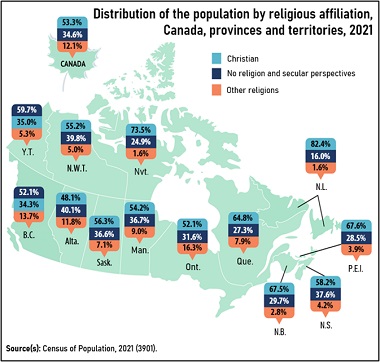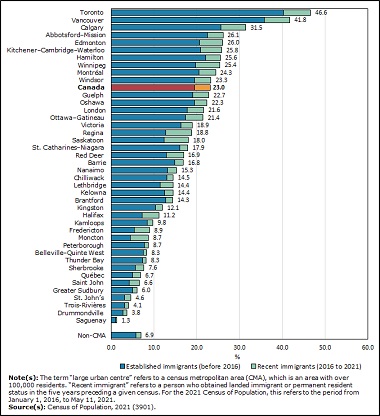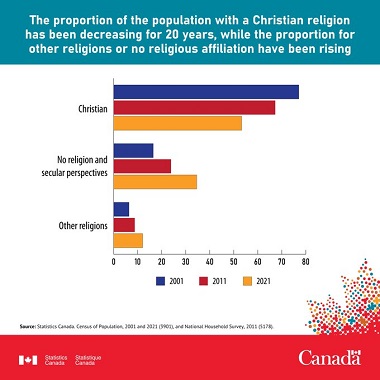
In 2021, more than half of the population of BC and Yukon reported having no religion, while the Christian religion was predominant in the other provinces and territories.
The majority of people in British Columbia have no religious affiliation. Along with Ontario, BC is the province with the highest percentage of people with a religious affiliation other than Christian – and that percentage is much higher in large urban centres such as Metro Vancouver than in rural areas.
BC / Metro Vancouver
These are some of the findings based on census data released by Statistics Canada October 26. Here is how the Statistics Canada daily report presented those results:
Yukon and British Columbia stand out with regard to their population reporting no religious affiliation. Close to three in five (59.7%) of Yukon’s population and slightly over one-half (52.1%) of British Columbia’s population reported no religious affiliation in 2021, compared with 34.6% for Canada as a whole.
In Ontario, 16.3% of the population reported being affiliated with a non-Christian religion, the highest proportion in Canada. In particular, Ontario posted the highest percentage of Muslims (6.7%) and Hindus (4.1%).
British Columbia ranked second among provinces and territories, with a large non-Christian population (13.7%). More specifically, it had the highest proportion of people affiliated with a Sikh religion (5.9%).
The proportion of the population who reported a religion other than Christianity was much higher in large urban centres (15.4%) than in small urban centres (3.2%) and rural areas (2.2%).
National scene

Ten of Canada’s 41 large urban centres have a higher proportion of immigrants than all of Canada.
The data released October 26 focused on three main topics – immigration, ethnocultural diversity and religion.
Following are the highlights noted in one of the reports, ‘The Canadian census: A rich portrait of the country’s religious and ethnocultural diversity’:
More than 450 ethnic or cultural origins were reported in the 2021 Census. The top origins reported by Canada’s population, alone or with other origins, were ‘Canadian’ (5.7 million people), ‘English’ (5.3 million), ‘Irish’ (4.4 million), ‘Scottish’ (4.4 million) and ‘French’ (4.0 million).
In 2021, over 19.3 million people reported a Christian religion, representing just over half of the Canadian population (53.3%). However, this proportion is down from 67.3% in 2011 and 77.1% in 2001.
Approximately 12.6 million people, or more than one-third of Canada’s population, reported having no religious affiliation. The proportion of this population has more than doubled in 20 years, going from 16.5% in 2001 to 34.6% in 2021.
While small, the proportion of Canada’s population who reported being Muslim, Hindu or Sikh has more than doubled in 20 years. From 2001 to 2021, these shares rose from 2.0% to 4.9% for Muslims, from 1.0% to 2.3% for Hindus and from 0.9% to 2.1% for Sikhs.
Racialized groups in Canada are all experiencing growth. In 2021, South Asian (7.1%), Chinese (4.7%) and Black (4.3%) people together represented 16.1% of Canada’s total population.
The portrait of racialized groups varies across regions. For example, the South Asian, Chinese and Black populations are the largest groups in Ontario, while the largest groups are Black and Arab people in Quebec, Chinese and South Asians in British Columbia, and South Asians and Filipinos in the Prairies.
Following are some of the passages relating to Canada’s religious make-up:
* Religion: another facet of diversity in Canada
Another long-standing and ongoing need for diversity data is on religious affiliation. This information has been collected every 10 years since 1871.
Information on the religion of the population is often used by governments, religious organizations and researchers in Canada. For example, data on religion are used to plan programs and help determine where to build churches, synagogues, mosques and temples. They are also used to understand diversity in Canada and the different experiences of religious groups.
- The majority of the population is Christian, but their share is decreasing

In 2021, more than 19.3 million people reported a Christian religion, or just over half of the Canadian population (53.3%). However, this percentage is down from 67.3% in 2011 and 77.1% in 2001.
Catholics are the largest Christian denomination in Canada, with 10.9 million people (29.9%) in 2021. The United Church (3.3%) and the Anglican Church (3.1%), two other Christian denominations, each had more than 1 million people in Canada. Orthodox Christians (1.7%), Baptists (1.2%), and Pentecostals and other Charismatics (1.1%) were the other Christian denominations most often reported.
In 2021, just under 2.8 million people, or 7.6% of the population, reported being Christian without further indication of a specific denomination, double the figure from 2011 (1.4 million).
With the exception of Orthodox Christians and people who simply reported being Christian, the proportion of affiliation in every Christian denomination decreased from 2011 to 2021.
- More than one in three Canadians reported having no religious affiliation
Approximately 12.6 million people, or more than one-third of Canada’s population, reported having no religious affiliation or having a secular perspective (atheist, agnostic, humanist and other secular perspectives). The proportion of this population has more than doubled in 20 years, rising from 16.5% in 2001 to 23.9% in 2011 and to 34.6% in 2021.
Immigration alone cannot account for this increase, since 21.5% of immigrants admitted from 2011 to 2021 had no religious affiliation. This proportion is lower than the proportion of the population with no religious affiliation posted in 2011 (23.9%) and 2021 (34.6%).
Part of the growth is due to the number of children under 10 who were born in Canada and have no religious affiliation. The number of children under 10 rose by 597,000 (+55.3%) from 2011 to 2021.
The main reason for the growth in the population with no religious affiliation is likely related to the fact that many people who reported a religious affiliation in the past now report no religious affiliation. The decline in religious affiliation is consistent with other findings that fewer people reported the importance of religious or spiritual beliefs in their lives, down from 71.0% in 2003 to 54.1% in 2019.
Go here to find 2021 Census data in general. Statistics Canada released two analytical articles on the October 26 update:
* The Canadian census: A rich portrait of the country’s religious and ethnocultural diversity
Apparently, more “articles on this topic will be published in the coming months in the Insights on Canadian Society series.”
It is too early to present much in the way of reaction to the findings, but a couple of early responses suggest some of what may be coming.

Joel Thiessen and Sarah Wilkins-Laflamme wrote ‘None of the Above: Nonreligious Identity in the US and Canada.’
Joel Thiessen (Professor of Sociology at Ambrose University and co-author, with Sarah Wilkins-Laflamme, of None of the Above: Nonreligious Identity in the US and Canada) tweeted:
Even though several of my books have dealt with the following, even I’m surprised (and shouldn’t be) by the surge in religious nones (34.6%) & decline in #Christian affiliation (53.3%) in the just released 2021 @StatCan_eng data on #religion in #Canada. www150.statcan.gc.ca/n1/en/daily-qu
Sarah Wilkins-Laflamme (Associate Professor in Sociology and Legal Studies at the University of Waterloo and author of Religion, Spirituality and Secularity Among Millennials) tweeted:
Data! Data! Data! It’s here! The 2021 Census data on religion in Canada just dropped from @StatCan_eng! Below are the numbers for all of Canada to get us started. In the coming days and weeks I’ll break it all down by province and religious tradition as well.
Levi Minderhoud, BC Manager for ARPA Canada tweeted:
The decline of Christian affiliation across the country is staggering. In 2001, 77.1% of Canadians identified as Christian. In 2011, it was 67.3%. In 2021 it’s 53.3%. If this trend continues linearly (which it won’t, but still), there would be no Christians left by the mid-2060s.
Census Mapper has created some interesting maps related to the census data in the Metro Vancouver / Fraser Valley area. Go here for one comparing the composition of the population based on Christian, other religious affiliation and no religious affiliation. It links to a similar map based on 2011 data. And here for a map showing the percentage of the population with no religious affiliation in various parts of this area.
